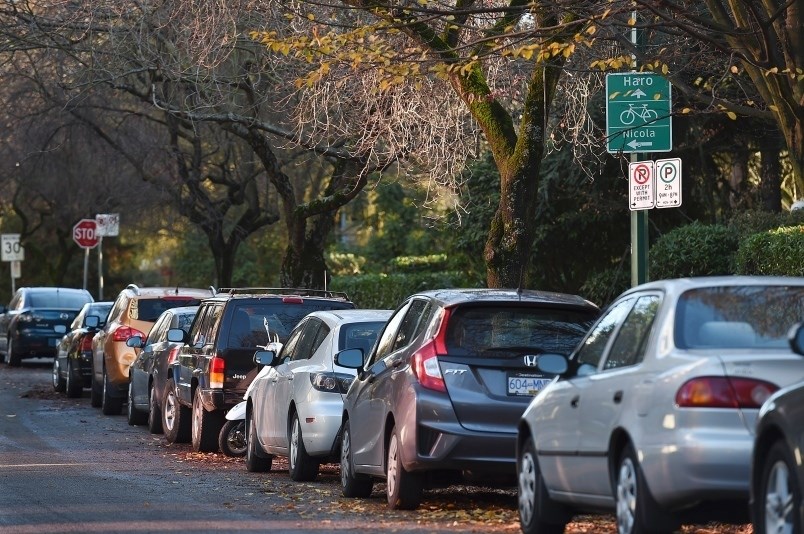The City Vancouver has revealed plans to curb the greenhouse gases from gas-powered vehicles in a move that would ding high-emitting cars over $1,000 per year.
Emissions from internal combustion engine vehicles currently make up 40 per cent of the city’s carbon output — city staff said curbing those emissions through new parking fees will put Vancouver on track to follow measures rolled out in cities like Montreal and Sydney, Australia.
Dubbed the “Climate Emergency Parking Plan,” the two-step scheme is expected to affect up to 150,000 Vancouver residents who park on the street. It’s also projected to reduce carbon emissions by 25 kilotonnes, or 10 per cent, by 2030 (one ton of CO2 gas takes up a cube about as tall, wide and long as a telephone pole; now, picture 25,000 of those).
Starting in 2022, the plan is expected to raise over $60 million over four years. That money is ostensibly earmarked to fight climate change and make the city a more walkable, bicycle- and electric vehicle-friendly place, though city council will make the final decision on how the money is spent.
3-TIER CARBON TAX FOR NEW VEHICLES
The first part of the plan aims to push people looking to buy a new car toward a low-emission option.
Under a three-tier system, annual fees will be levied on the purchase of new vehicle models from 2023 onward based on how much carbon they emit.
High-polluting vehicles, including most gas-powered luxury sports cars, pick-up trucks and large SUVs would pay a $1,000 annual pollution charge, while sporty sedans and more efficient SUVs would pay a $500 yearly fee.
All electric, hybrid and economy vehicles, as well as wheelchair accessible vehicles, are exempt under the plan.
Roughly 20,000 Vancouverites buy a new vehicle every year, according to city staff, and about half of those park on the street. Of those 10,000 cars parked on the street, staff estimate 2,500 would pay a $1,000-a-year fee, 1,500 would pay $500 and the remaining 6,000 would be exempt.
MOVE TO UNIVERSAL PERMIT PARKING
With only 10 per cent of Vancouver’s residential streets currently under a permit system, the new climate parking plan paves the way to fully regulate residential street parking in the city.
In addition to the three-tiered annual fee on new vehicles, all residents who park their vehicles on the street overnight and are not currently regulated by permit parking would be charged a $45-per-year fee to park in front of their house.
In a call with reporters Monday morning, city staff said the move to universal permit parking will only be in place from 10 p.m. to 7 a.m.
That means no fee changes to visitors looking to park on the street during daylight hours. Overnight visitors, however, would be charged $3 per night, something they could pay through the PayByPhone app or a neighbourhood pay station.
Staff said the system would also allow them to manage parking more effectively in problem areas. The city will also be working with neighbouring municipalities such as Burnaby to help prevent residents from parking on the other side of the city border to avoid fees.
The city has earmarked $900,000 to roll out both parts of the new program; enforcement is expected to cost between $500,000 and $1 million, and may take advantage of new technology such as licence plate recognition.
All of that money is expected to easily be recouped from the $60 million projected to be raised between 2022 and 2025.
PUBLIC SURVEY
The new plan is a product of a spring public survey that saw 12,000 residents voice their opinion.
Vancouver residents can provide feedback on the new plan in a second public survey available online between June 14 and July 5.
City council will consider that public response when it votes to approve the plan in the fall. If approved, the climate emergency parking plan would launch in 2022.
The parking plan is part of the city’s aggressive blueprint to target carbon pollution under the Climate Emergency Action Plan. Passed in November 2020, the action plan targets emissions from both gas-powered vehicles (40 per cent of city emissions) and the construction and operation of buildings (over 50 per cent of emissions).
“This is a key part of that plan,” Coun. Christine Boyle said of the parking element. “It might be that we tweak the numbers to make sure everyone is exempt who should be. But if we’re committed to those reduction targets, I don’t think we can waver on a plan like this.”
In addition to the new parking plan, Vancouver is considering a fee on drivers going to and from downtown.
Last week, council narrowly averted a year-long delay in its zero-emissions building plan in a vote that sought to clear a backlog in building permit applications.
With files from Mike Howell
Stefan Labbé is a solutions journalist. That means he covers how people are responding to problems linked to climate change — from housing to energy and everything in between. Have a story idea? Get in touch. Email [email protected].




